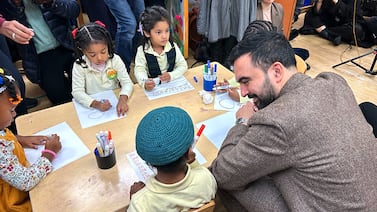Low-income families in Colorado could receive $120 per child to help pay for groceries next summer if state lawmakers agree to tap a federal program aimed at reducing childhood hunger when school is out.
The legislature begins meeting Friday for a special session to address spiking property taxes after voters rejected Proposition HH. But lawmakers will also consider the summer grocery program because the state must opt in by Jan. 1 to participate in 2024.
The program has a wonky name — Summer Electronic Benefits Transfer, or Summer EBT — but the idea is simple: Reduce childhood hunger in low-income families when school meal programs are on break or harder to access over the summer. Eligible families would get a card preloaded with money to buy food that is sent to their homes when school’s out.
Families of up to 350,000 Colorado children would benefit.
The program would be another step in Colorado’s continuing effort to shrink the number of children who go hungry in the state. Starting this school year, the vast majority of Colorado students can get free school meals regardless of family income because of a universal meal program approved by voters in 2022.
A program similar to Summer EBT was in place during the pandemic, but it was optional for school districts, and it expired last summer. The new Summer EBT program would require all districts in the federal government’s National School Lunch Program to participate. In Colorado, that’s every district but Aspen.
Helping low-income families pay for groceries in the summer reduces childhood food insecurity, increases fruit and vegetable intake, and cuts the amount of sugary beverages children drink, according to federal evaluations of a pilot Summer EBT program in several states.
Families would be eligible for Summer EBT in 2024 if they have household incomes at or below 185% of the federal poverty level — $55,500 for a family of four — and have children attending preschool through 12th grade in a public school that offers the National School Lunch or Breakfast Program.
For the state to participate, Colorado lawmakers will have to appropriate about $3.5 million to help administer the program, said Brehan Riley, school nutrition director at the Colorado Department of Education. The federal government would match that amount, plus send $35 million to $42 million directly to qualifying families in the form of benefit cards. The program would be jointly administered by the Colorado Department of Human Services and the education department.
Riley said children will still be able to get any free summer meals offered through their school district even if their families also receive the Summer EBT benefit.
“The $120, I think it averages out to $1.33 a day,” she said. “So it’s supposed to supplement” the summer school meals program. Some students can’t get to local schools that offer summer meals because they live too far away or don’t have transportation.
If state lawmakers approve the Summer EBT program during the special session, which could last just three days, Colorado would join 10 other states planning to participate next summer. They include Illinois, Kansas, Maryland, Massachusetts, Michigan, Minnesota, New Jersey, Ohio, Virginia, and West Virginia
The Colorado State Board of Education voted 7-1 in support of the proposed Summer EBT bill on Tuesday. Board member Debora Scheffel, a Republican who represents a large swath of eastern Colorado, voted no. Board member Steve Durham, also a Republican, was absent.
If lawmakers approve the Summer EBT bill, Riley said the most important thing parents can do to ensure they’re eligible is fill out the free and reduced-price meal form at their child’s school. In some districts, the form may have a slightly different name, possibly the “family economic data survey.”
“We are hearing from districts that families haven’t been filling out those forms,” she said. “In order to receive summer EBT benefits, that form has to be in place.”
Ann Schimke is a senior reporter at Chalkbeat, covering early childhood issues and early literacy. Contact Ann at aschimke@chalkbeat.org.






